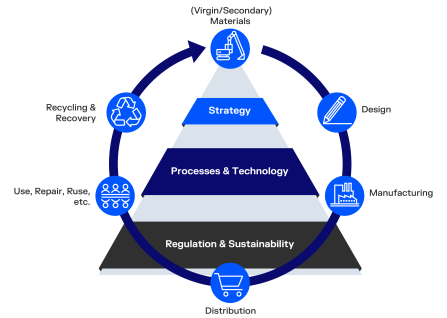
A Technological Enabler for the Circular Economy
The Digital Product Passport (DPP) will help address three key challenges:
- How can we ensure compliance with the increasing number of global regulations?
- How can we improve the resilience of our supply chains and the sustainability of our products and processes?
- How can we leverage lifecycle data to create additional value beyond compliance and sustainability?
This is achieved through capturing product information at every stage of the value chain, digitally storing information including a unique identifier to link digital data with the physical object, and providing free access via data carriers (e.g., QR code).
According to an industry-specific, phased approach, this regulation applies to all physical goods that are placed on the market or put into service, including components and intermediate products. It also applies to EU imports, supports compliance verification, and is compatible with open standards. Additionally, it should be interoperable across product groups and systems.

Early Preparation for the DPP Pays Off
By preparing your company for the DPP, you can achieve price premiums, better product positioning, process efficiency gains, lower costs, more informed decision-making, and untapped opportunities in your portfolio.
This preparation includes (in-)direct involvement in shaping the DPP regulation, identifying product data that can be retrieved from your current reports, ensuring that all relevant teams are informed and engaged, and planning for future necessary changes.
Through the synergistic expertise of Fujitsu and Phiyond, these key issues can be tackled collaboratively, significantly accelerating your DPP implementation project.


Patrick Peter
 phiyond.de
phiyond.de
